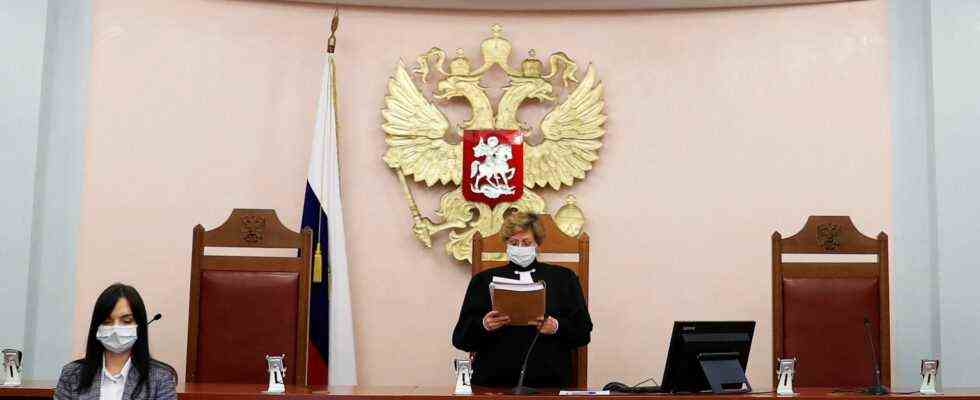Status: December 28, 2021 8:58 p.m.
The decision of the Russian Supreme Court to dissolve Memorial has sparked international criticism. The Foreign Office described the judgment as “incomprehensible”, while France reacted with “indignation” and “concern”.
The order of the Russian Supreme Court to disband the country’s oldest and most prestigious human rights organization has sparked international outrage. The German government criticized the decision against Memorial International as “more than incomprehensible”. The court’s order “contradicts international obligations to protect basic civil rights, which Russia has also entered into,” said a spokeswoman for the Foreign Office. “The decision worries us not least because it removes the voice of the victims of oppression and repression.”
Legitimate criticism from organizations like Memorial should be listened to, the spokeswoman said. As part of an international network, Memorial makes “an indispensable contribution to the research, documentation and prevention of serious human rights violations and is thus also an expression of our common European self-image to clearly identify and deal with violations of human rights”. Memorial has been campaigning for the coming to terms with the Stalinist crimes in the Soviet Union and for the protection of human rights in today’s Russia for more than 30 years.
Supreme Court in Russia decides to dissolve the human rights organization Memorial
Demian von Osten, ARD Moscow, daily news 5:00 p.m., December 28, 2021
Strong international criticism
The US State Department condemned the court decision. “We call on the Russian authorities to end their harassment of independent voices and human rights defenders and to show solidarity with those who have been victims of repression for exercising their right to freedom of expression, association and assembly,” said the Foreign Ministry spokesman , Ned Price.
The Polish government also criticized the memorial ban. Poland will never abandon “the wonderful people of Memorial”, said a spokesman for the Foreign Ministry in Warsaw, according to the PAP agency. The Czech Republic also expressed concern. The ruling was “a symbol of repression against civil society and the lack of an independent judiciary” in Russia, said the Foreign Ministry in Prague. By taking this step, Russia is primarily harming its own citizens. “No society can lead a long life in lies about its own history,” it continued.
France responded with “indignation” and “concern” to the ruling. It was a “terrible loss for the Russian people,” said Foreign Minister Jean-Yves Le Drian. The Russian people have a right to be properly informed about their past. The Secretary General of the Council of Europe, Marija Pejcinovic Buric, called the ban “devastating news” for civil society. Russia seems to be “moving further and further away from our common European standards and values”.
“Total disregard for democratic norms”
Criticism also came from non-governmental organizations: The verdict was a heavy blow for Russian society and for all of Europe, according to a statement by several organizations, including the Heinrich Böll Foundation, Amnesty International, the German PEN Center and the Buchenwald Memorials Foundation and Mittelbau-Dora. “Like no other organization, Memorial stands for an open, philanthropic, democratic Russia.” The ban is politically motivated. The Russian state is fighting the confrontation with its own history of injustice.
The Right Livelihood Foundation, which awards the Alternative Nobel Prize, denounced the court’s decision as politically motivated. She is unscrupulous and shows the “complete disregard for democratic norms on the part of the Russian government,” said the foundation’s managing director, Ole von Uexküll.
The team of the imprisoned Kremlin opponent Alexei Navalny recalled Memorial’s aims to preserve the memory of the Stalinist repression – “so that this nightmare never happens again in our country. It is obvious that this is now not in line with the aims of the Russian state”.
Sub-organization is also threatened with closure
Memorial itself announced legal action against the court ruling. “We will challenge the decision of the Russian Supreme Court in any way we can,” the organization said. “And we will find legal ways to continue our work.”
The future of the Human Rights Center Memorial will also be decided before the Supreme Court in Moscow. Another hearing in the trial of the Memorial sub-organization is scheduled for Wednesday. The public prosecutor’s office has also accused her of violating the “Foreign Agents” law, as well as the allegation that the center glorified “terrorism and extremism”.
Judgment against Memorial
Martha Wilczynski, ARD Moscow, December 28, 2021 4:38 p.m.

